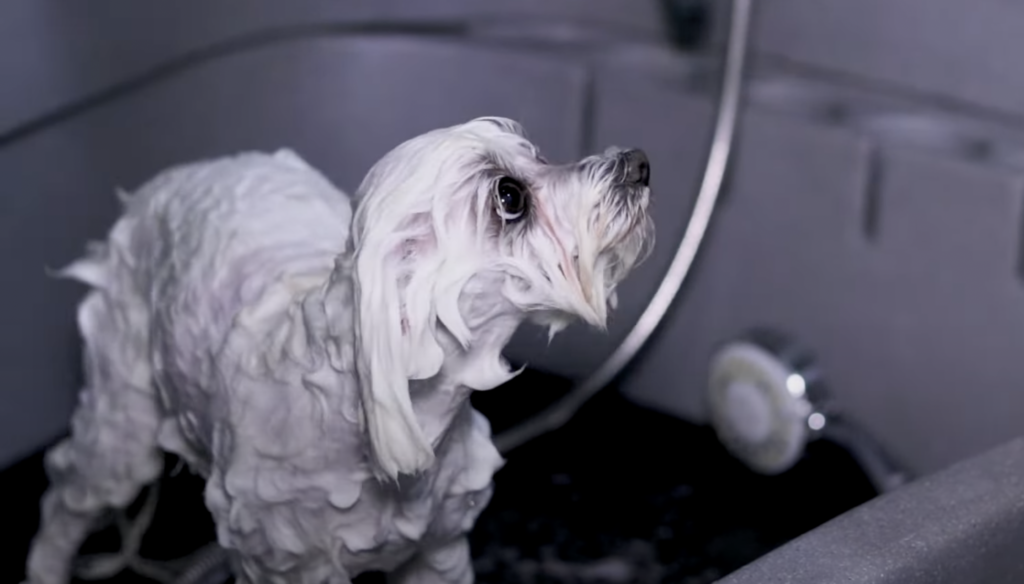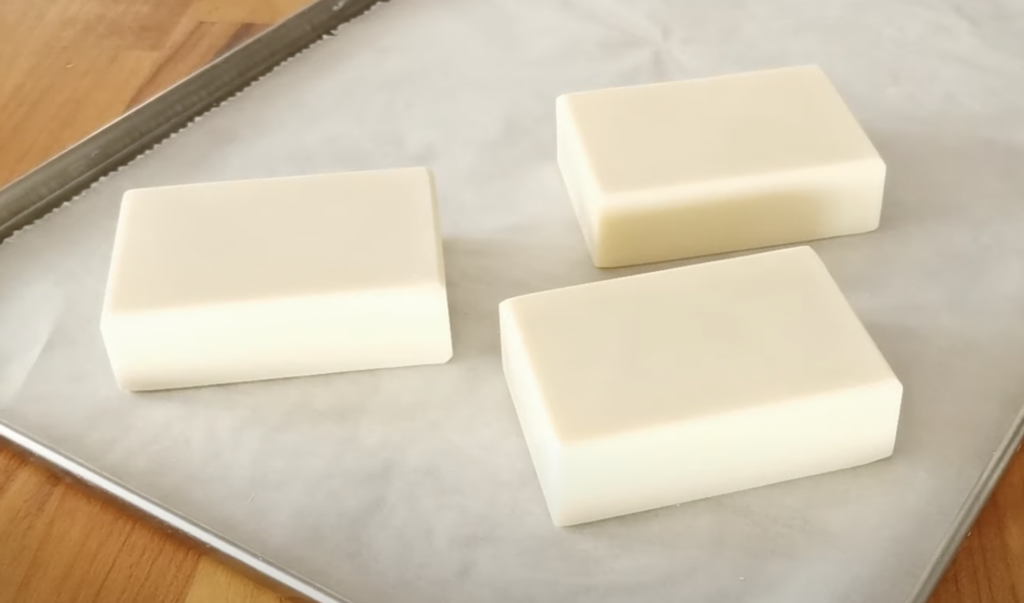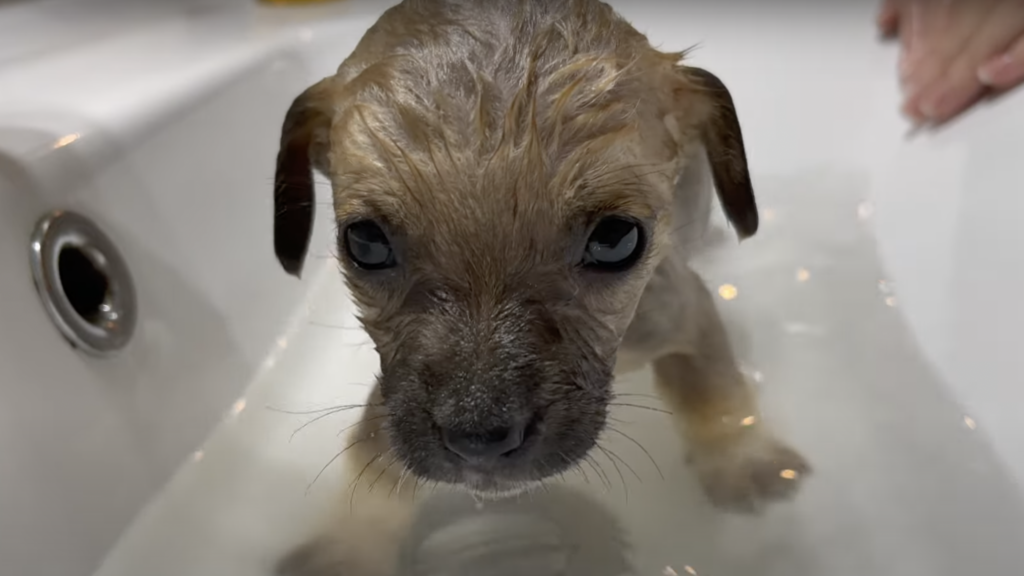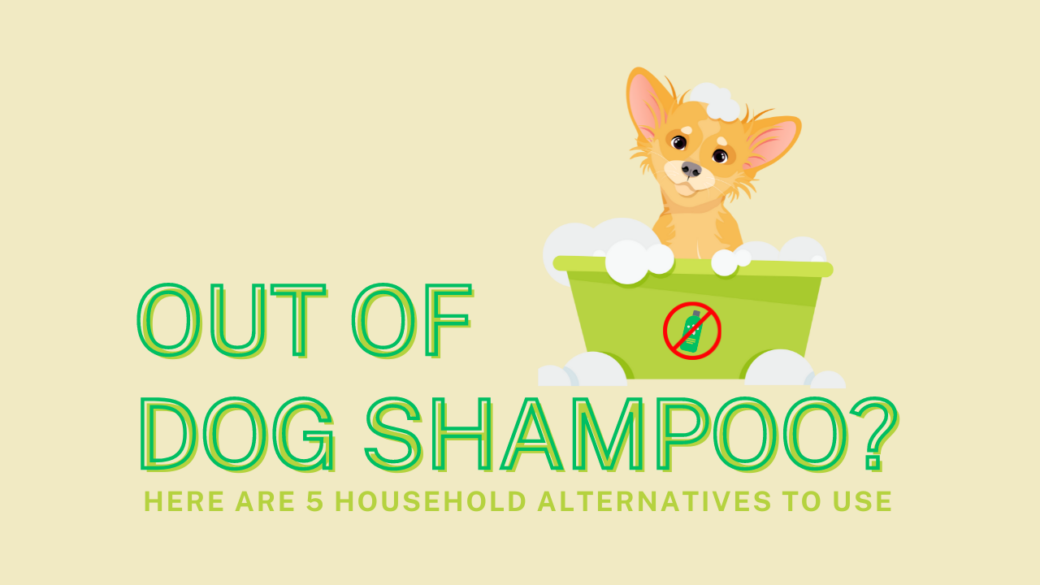Some dogs just love to get mucky. Whether it’s a fresh puddle from the rain or a smelly bog found in the wood, they just jump right in and splash around to their heart’s content. This can be fun for a while, but taking them home is when reality begins to set in. All of a sudden, the situation becomes stressful as you begin to think about the mess, the smell, the struggle of bathtime… Only then do you realise that you’re out of dog shampoo.
Many pet parents have been in this situation. A bottle of dog shampoo can last up to a year, so it’s not an item that needs to be bought frequently, and it can be easily forgotten. If you’re currently experiencing this stress, or you have in the past, there are some dog shampoo alternatives you should know about. Although these substitutes cannot be used all of the time, they’re handy to know of if you find yourself without any dog shampoo.
But it’s important to remember that a dog’s skin is its largest organ, anything used on it can be absorbed into the body. Shampoo products made for dogs are formulated to keep a dog’s skin and coat healthy. This is especially important if a dog has a skin condition; if your dog does have a specific skin condition, check with your vet before using any household alternative.
This article will list five of the best household substitutes pet lovers can use if their dogs are in need of a wash, but they have no dog shampoo. It also aims to educate dog owners on the ways each alternative can affect the dog’s coat and skin.
Table of Contents
What Are Some Household Alternatives to Dog Shampoo?
If you are out of dog shampoo and your dog is in desperate need of a bath, then you might be wondering what you can use around the house. Some household items can be used to wash a dog’s fur on the odd occasion, but shampoo specifically formulated for dogs is safest for their skin and coat.

However, if you need some alternatives to dog shampoo, you should hopefully have one of the items listed below available in a cupboard.
1. Baby Shampoo
The best human shampoo for dogs is actually baby shampoo. As babies have sensitive skin, all baby shampoo is designed to be soothing and gentle, more so than regular shampoo. It contains fewer perfumes and ingredients, so it will not strip a dog’s fur of its natural oils. For this reason, it is a suitable alternative to dog shampoo in a pinch.
A dog’s skin is different from a human’s skin. If a dog were washed with human shampoo, even baby shampoo, too often, its skin could dry out quickly. This can result in further issues, such as excessive itching, inflammation, red and irritated skin, sores, etc.
Only a small amount of baby shampoo and warm water is required to get a lather going. After washing, ensure to rinse all of the shampoo away thoroughly.
Baby shampoo is not the best alternative to use if you’re trying to wash a very dirty dog.
2. Oatmeal
Known for its soothing qualities, oatmeal is found in many commercial grooming products for dogs. It’s a great option for dogs suffering from sensitive skin as it will calm itchiness and any irritation, and it will not strip their skin and coats of natural oils.
To create an oatmeal shampoo, you will need:
- 2 pints of warm water
- 1 cup of ground oatmeal (flour consistency)
- 1/2 cup of baking soda
Stir the ground oatmeal and baking soda in a large bowl until completely mixed, then add the warm water and continue stirring until it is fully incorporated. This can then be used as a shampoo.
3. Castile Soap
Castile soap is one of the most moisturising products on this list. It comes in bar and liquid form and contains only natural ingredients, like coconut oil, meaning that it is suitable for dogs with sensitive or dry skin. These ingredients also help to leave the dog’s fur smooth and shiny.
In homemade shampoos for dogs, liquid castile soap – or dish soap – is often used to combine the ingredients together. It can tackle even the dirtiest of dogs.

Using castile soap is simple. After your dog has been placed in the bath, lather the soap into its coat and work it into the dog’s wet fur well. As with any cleansing product, it is crucial to avoid the dog’s eyes. Once clean, rinse the soap off completely.
4. Apple Cider Vinegar and Water
Many homemade dog shampoos use white or apple cider vinegar; this is due to its natural deodorising properties. It is also helpful in adding shine.
Apple cider vinegar is easy to use to wash dogs. All you have to do is mix equal measures of vinegar and water and apply the mixture to your fur baby’s coat. Rinse it off to avoid your dog smelling strongly of vinegar.
5. Dish Soap
Dish soaps should only be used as an absolute last resort. Although it doesn’t harm human skin, it can be harsh on the dog’s skin and coat, stripping away the necessary healthy oils.
If you must use dish soap to wash a dog, only use a small amount, similar to baby shampoo. When washing dish soap off of the dog, ensure it has all been rinsed before drying its coat; if any dish soap is left on, it can cause irritation.
Bonus: Dry Alternatives to Dog Shampoo
Here are a few dry alternatives that will help get your dog clean without the hassle of creating a wet shampoo substitute.
1. Baking Soda
Baking soda is a great alternative to dog shampoo; however, it isn’t as effective on dogs that are extremely muddy as some of the other substitutes in this article. It can be used as a dry shampoo, although it is advised to use it outside as baking soda can be a little messy.
To use baking soda, begin by brushing your dog’s coat with a dog brush or comb to remove any loose hair and/or dirt. You can then take one cup of baking soda and begin to massage it into your pet’s coat and skin. Once it has been rubbed in, leave the baking soda on your dog for up to five minutes before brushing it out completely.
There are recipes for creating your own shampoo for dogs with baking soda. It is a popular ingredient because it helps to balance the vinegar’s and the water’s acidity.
2. Corn Starch
Another dry alternative to shampoo for dogs is corn starch. Again, this is similar to dry shampoo. It binds with the grease molecules in the dirt and allows it to be brushed off of the dog’s coat without affecting its oils. Grease is usually the main culprit when there is dirt and foul odours on a dog.
Corn starch can be used on its own or with baking soda. Either way, it should be sprinkled lightly onto the dog’s coat and rubbed in. Make sure to cover all of the dog’s body to clean it as well as you can, but remember to avoid the face. This can then be left on for five to ten minutes before brushing the powder out.
Ingredients to Avoid When Looking for a Dog Shampoo Alternative
Below, 13 of the worst dog shampoo ingredients are shown; these ingredients can sometimes be found in other shampoo and cleaning products. So, if any of the alternatives you plan on using as a shampoo for your dog list these ingredients, do not use them:
- Artificial colours
- Artificial fragrances
- Cocamide MEA
- Formaldehyde preservatives
- Isothiazolinone preservatives
- Mineral oil
- Paraben preservatives
- Polyethylene glycol
- Propylene glycol
- Pthalates
- SD-40
- Sodium lauryl sulphate
- Triethanolamine
Dog Shampoo Alternatives: FAQs
With knowledge of which alternatives can be used and the ingredients to avoid, you are much more prepared to wash your dog without the use of doggy shampoo. If you still have questions, however, you might find the answers below.
I have all of the items mentioned above; how can I decide which is best for my dog?
There are five factors to consider when choosing which shampoo alternative is best for your dog. These are:
Level of Cleansing
Firstly, you’ll have to determine how dirty your dog is. Dogs with considerable amounts of dirt on them will require a more heavy-duty wash, so they will not benefit from the dry shampoo alternatives. The best option might be castile soap.
Condition of the Dog’s Skin
Next up, what is the condition of your dog’s skin? If a dog suffers from sensitive or irritated skin, then one of the soothing substitutes will work best, like the oatmeal alternative.
Check the dog’s body for flakiness or any inflammation. Speaking to a vet about your dog’s skin will provide you with expert advice, and the vet might be able to prescribe something for your dog.
Flea and Tick Treatment Required
Additionally, some dogs might require flea and tick treatment. This means getting rid of the pests while calming down the skin irritation they can cause.
If you are unsure which alternative to use, you might be better off waiting until you can pick up dog shampoo from the pet shop.
Can I use adult shampoo on dogs?
No, adult human shampoo should never be used on dogs. Human shampoo can strip dogs’ coats of healthy oils, causing irritation in some cases. Using a gentle substitute, like baby shampoo, is safest, but only a small amount should be used, and it should be rinsed off thoroughly.
Can I make my own homemade dog shampoo for future use?
Yes, you can make homemade shampoo for dogs. As previously mentioned, the most common ingredients are apple cider or white vinegar, castile or nontoxic dish soap, and baking soda. All of these ingredients are safe to use on dogs in small amounts as long as they aren’t the primary method of cleansing; shampoo designed for dogs is the safest and should be used most often.
There are many recipes for homemade shampoo for dogs; an oatmeal shampoo recipe has previously been provided in this article. However, if you want a different shampoo to create at home, then using aloe vera and glycerin is another good option.
For the aloe vera and glycerin shampoo, you will need:
- 2 pints of water
- 1 cup of baby shampoo
- 1 cup of apple cider or white vinegar
- 2 tablespoons of aloe vera gel
- 1/3 cup of glycerin
All of these ingredients can be mixed together in a spray bottle. When spraying a dog’s coat with this shampoo, ensure to avoid its eyes and mouth. You can then work the shampoo into the dog’s coat before rinsing well with warm water.
Is there a homemade shampoo for dogs to repel fleas and ticks?
It is possible to create a shampoo for dogs at home that will help repel pests like fleas and ticks. The most useful ingredient for this is lavender. Adding a lavender essential oil can
Not all essential oils are safe for dogs, though. Severe toxicity and immune-mediated reactions can happen after a dog is exposed to particular essential oils. Because of this, never use 100% essential oils from aromatherapy items on your dog.
Which is the right store-bought dog shampoo for my dog?
To determine which dog shampoo is right for your dog, you will have to look at the following aspects:
Age?
Puppies require a gentler shampoo than adult dogs; their skin is much more sensitive and could be easily irritated by some of the tougher dog shampoos on the market. They will require specially formulated puppy shampoos.

Skin Conditions?
If your dog experiences skin issues, such as dryness, flakiness, irritation, and itchiness, then it will need a soothing shampoo. There are different moisturising dog shampoos available, but it might be best to speak to a vet before deciding which one meets your dog’s needs.
Fleas or Ticks?
Dogs with fleas and ticks will not only need a shampoo to get rid of these pests, but they will also require a shampoo that calms the irritation they can cause.
Coat Type?
Different dog breeds have different coats; Poodles are curly and can get matted easily, while Labradors have short coats. Depending on your dog’s coat type, you might need to find a store-bought shampoo that tailors to its needs. Some dogs might even require an intense conditioner to smooth out their fur.
Foul Odours?
Deodorising shampoos can be great for dogs that smell badly. Just be sure to avoid shampoos that contain artificial perfumes.
To Sum Up
Proper dog shampoo is always the best choice when bathing your fur baby, but there are some household items you can use in a pinch. Baby shampoo, oatmeal, castile soap, apple cider vinegar and water, and even dish soap can be used as dog shampoo substitutes in some cases. If you do opt to use one of these alternatives, ensure to read the labels of all items you use before applying it to your dog and take extra precautions to ensure that it is washed off properly.
Finally, if your dog ever suffers from any skin issues, speak to your vet first before choosing a product to use on their coat. It’s also important to remember that the best way to keep your dog clean and healthy is to use dog shampoo regularly and keep up with a regular grooming routine.

